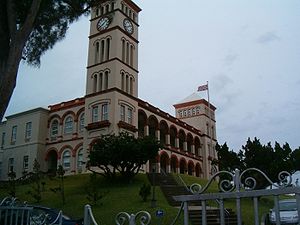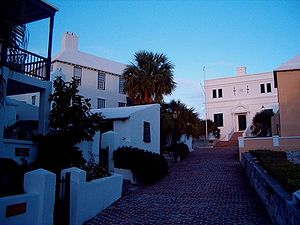
House of Assembly of Bermuda
Encyclopedia


The House of Assembly is the lower house of the Parliament of Bermuda
Parliament of Bermuda
Parliament has two chambers. Originally, there was only one, the House of Assembly, which held its first session in 1620, making Bermuda's Parliament amongst the World's oldest legislatures. An appointed Privy Council originally performed roles similar to that of an upper house, and of a cabinet...
. The house has 36 members, each elected for a five year term in a single seat constituencies.
The House of Assembly was originally the only house of Bermuda's parliament, and held its first session in 1620. It first met in Saint Peter's Church, in the original colonial capital, Saint George's
St. George's, Bermuda
St. George's , located on the island and within the parish of the same names, was the first permanent settlement on the islands of Bermuda, and is often described as the third successful English settlement in the Americas, after St. John's, Newfoundland, and Jamestown, Virginia. However, St...
, until its own building, the State House
State House, Bermuda
The State House in St. George's was the first purpose-built home of the House of Assembly, which then constituted the only chamber of the Parliament of Bermuda. Other than fortifications, it was Bermuda's first stone building...
, was completed, also in 1620. It met in the State House until the capital was moved to Hamilton in 1815.
The House of Assembly was created at a time when Bermuda, or The Somers Isles, was administered by the Somers Isles Company
Somers Isles Company
The Somers Isles Company was formed in 1615 to operate the English colony of the Somers Isles, also known as Bermuda, as a commercial venture. It held a royal charter for Bermuda until 1684, when it was dissolved, and the Crown assumed responsibility for the administration of Bermuda as a royal...
(1615-1684), an offshoot of the Virginia Company
London Company
The London Company was an English joint stock company established by royal charter by James I of England on April 10, 1606 with the purpose of establishing colonial settlements in North America.The territory granted to the London Company included the coast of North America from the 34th parallel ...
. The House of Burgesses
House of Burgesses
The House of Burgesses was the first assembly of elected representatives of English colonists in North America. The House was established by the Virginia Company, who created the body as part of an effort to encourage English craftsmen to settle in North America...
had been created in Virginia in 1619. It was overseen by a Governor appointed by the Company (from 1684, by the Crown), although, for much of the colony's history, the real political power lay with the appointed Privy council, or Governor's Council, composed of members of Bermuda's wealthy merchant class. During periods when the colony was without a Governor, the President of the Council might find himself Acting Governor, also. The balance of power began to shift away from the Council in the 19th Century, when Bermuda assumed a new importance in Imperial security, and when the Governor became also the Commander in Chief of the naval establishment and military garrison. Following revisions made to Bermuda's parliamentary system in the 1960s, the two roles once performed by the dissolved Council are now performed by an appointed upper house, the Senate, and a Cabinet, which is composed of Ministers appointed from elected Members of Parliament from the House of Assembly.
This was only one of the changes made in the 1960s, largely as a result of the civil rights movement. A constitution was introduced which made Bermuda's parliamentary system more like the Westminster system
Westminster System
The Westminster system is a democratic parliamentary system of government modelled after the politics of the United Kingdom. This term comes from the Palace of Westminster, the seat of the Parliament of the United Kingdom....
. Political parties were legalised, and the system of a majority Government, from which a Premier was appointed and the Cabinet Ministers were drawn, and a minority Opposition was adopted. The Senate was created to perform a function akin to that of the House of Lords, in London, although its members were appointed, rather than being hereditary, noble peers. The system of suffrage, by which the members of the lower house were elected, and which, as in Britain, had historically been limited to male landowners, was finally extended to all adults: universal adult suffrage
Universal suffrage
Universal suffrage consists of the extension of the right to vote to adult citizens as a whole, though it may also mean extending said right to minors and non-citizens...
. Although non-white males had not been specifically banned from either voting or standing for election, the land-owning requirement had effectively barred all but a few from voting. When the numbers of non-white land owners had increased, a minimum property value was added. The first non-white to stand for election was schoolmaster Augustus Swan, who owned two houses and dry goods stores in Hamilton
Hamilton, Bermuda
Hamilton is the capital of the British Overseas Territory of Bermuda. It is the territory's financial centre and a major port and tourist destination.-Geography:...
and Flatts
Flatts Village, Bermuda
Flatts Village is a small settlement in Bermuda, lying on the southern bank of Flatt's Inlet in Hamilton Parish, almost exactly between the territory's two incorporated municipalities, Hamilton and St. George's.-History:...
. He was part of a coalition that pledged black support for white candidates Samuel Nash, Ambrose Gosling and RJP Darrell, in exchange for white support of Swan, but the plan failed and none of these candidates won a seat. The first non-white person to actually gain a seat in the House of Assembly was William Henry Thomas Joell, elected MCP for Pembroke
Pembroke Parish, Bermuda
Pembroke Parish is one of the nine parishes of Bermuda. It is named after English aristocrat William Herbert, 3rd Earl of Pembroke ....
in May, 1883, and who died in 1886 while still holding his seat. He was replaced by John Henry Thomas Jackson, who was also non-white. Bermuda's women were denied the vote, and the ability to stand for election, entirely until 1944.
Further changes to the Parliamentary system in 1976 saw the vote restricted to Bermudians, whether Bermudian by birth or by granting of status, although other British and Commonwealth citizens who were registered to vote before that date remain enfranchised. In the 1980s, the voting age was lowered from 21 to 18 years of age.
| Party | % of Vote | Seats | Current Assembly | ||||||||||||||||||||||||||||||||||||
|---|---|---|---|---|---|---|---|---|---|---|---|---|---|---|---|---|---|---|---|---|---|---|---|---|---|---|---|---|---|---|---|---|---|---|---|---|---|---|---|
| Progressive Labour Progressive Labour Party (Bermuda) The Progressive Labour Party is a political party in Bermuda. It has been in power since 1998, winning subsequent elections in 2003 and 2007.- Formation :... |
51.6 | 22 | |||||||||||||||||||||||||||||||||||||
| United Bermuda United Bermuda Party The United Bermuda Party was a political party in Bermuda. It represented itself as centrist party in favor of a moderate social and fiscal agenda... |
48 | 14 |

